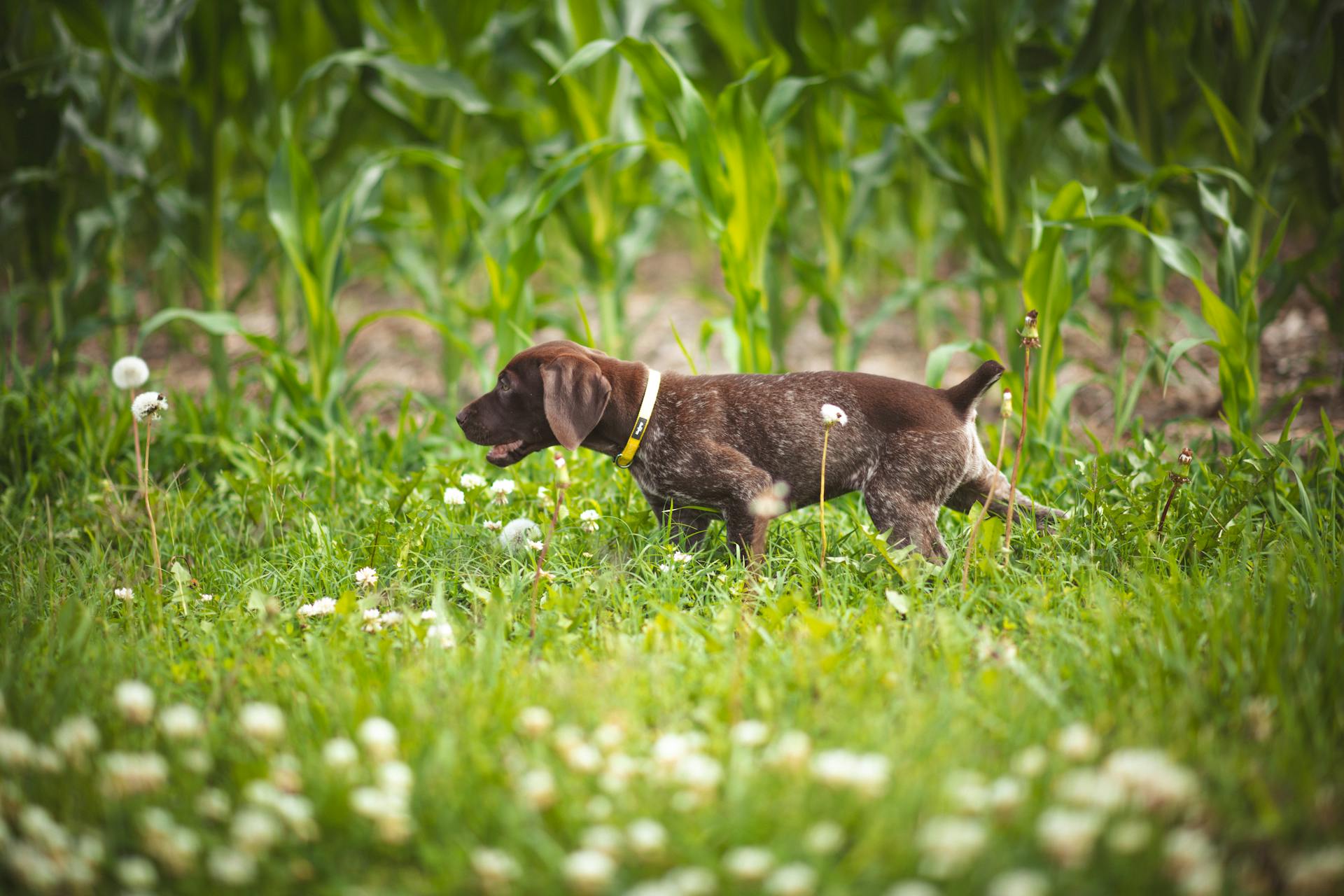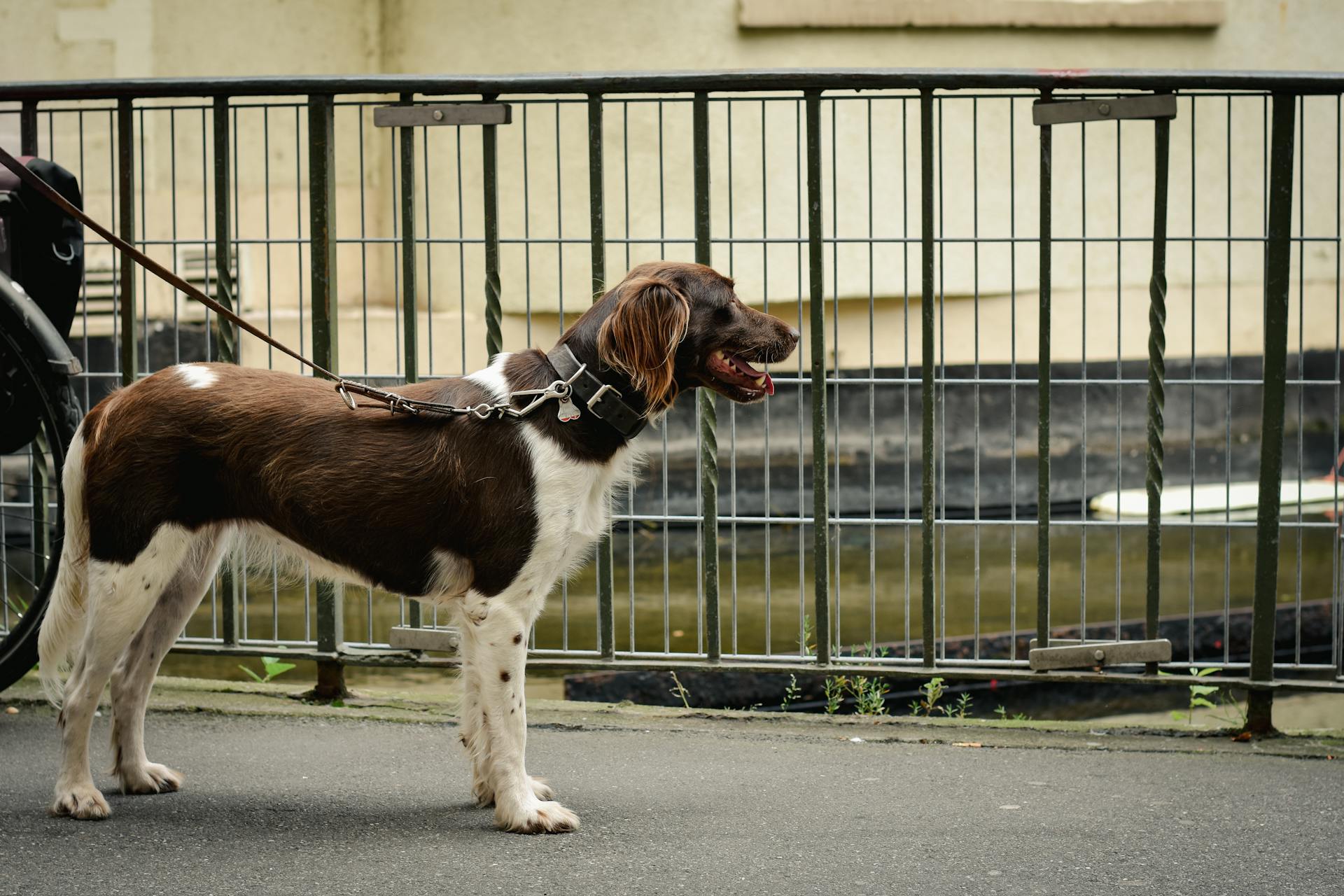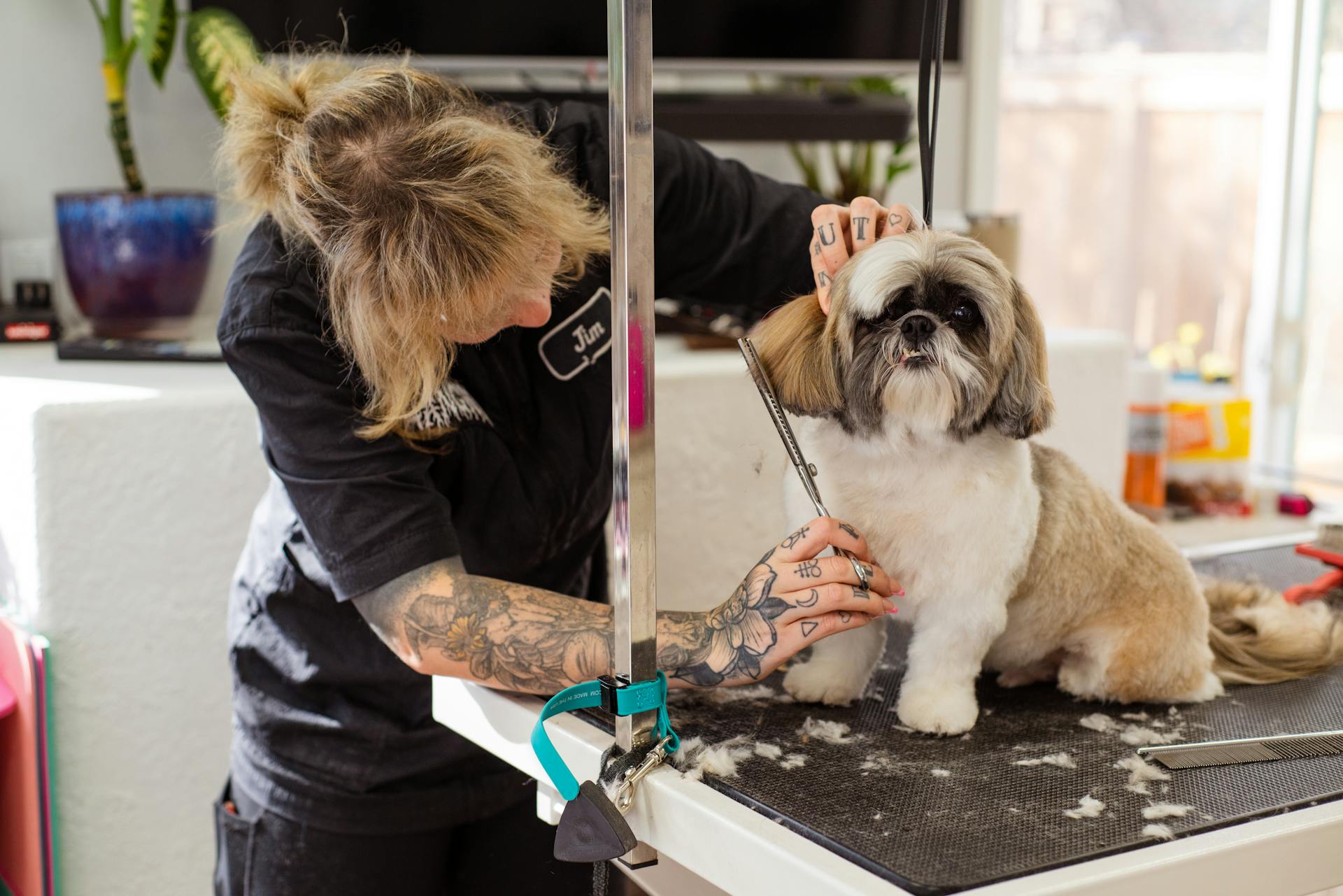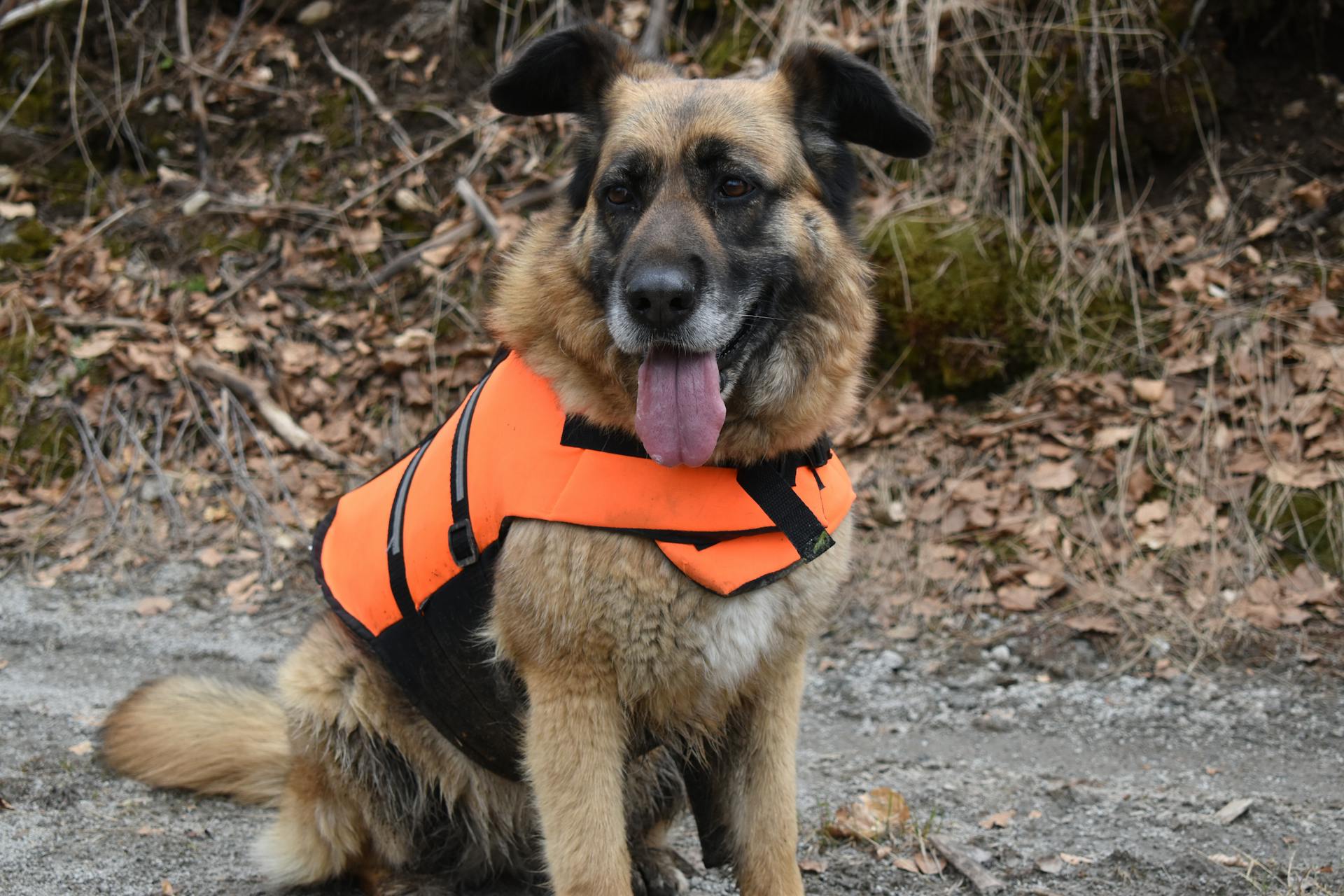
The Small Münsterländer is a versatile hunting breed originating from Germany. They were developed to assist hunters in flushing and retrieving game.
Their friendly and outgoing nature makes them a great companion for families. They are highly trainable and thrive on mental and physical stimulation.
Originally bred to hunt small game, the Small Münsterländer has a strong prey drive and loves to chase birds and rabbits. They require regular exercise to keep them happy and healthy.
Despite their energetic nature, they are generally quiet and don't bark much, making them a great choice for apartment dwellers.
You might enjoy: Kleiner Münsterländer
Physical Characteristics
The Small Münsterländer is a medium-sized dog with a strong and harmonious build. It stands between 20.5-22 inches at the withers, with males being slightly larger than females.
The ideal weight range for this breed is between 38-58 pounds, with males being the heavier of the two. The dog's movement should be athletic, graceful, and far-reaching.
The coat is a key feature of the Small Münsterländer, and it should be medium length, glossy, dense, and straight or slightly wavy. The dog's skin is also important, and it should be tight-fitting.
Additional reading: Large Münsterländer
Appearance
The Small Munsterlander Pointer is a stunning breed with a harmonious build and balanced proportions. Its strong hindquarters and athletic movement make it a joy to watch.
Males typically stand between 20.5-22 inches (52-56 cm) tall at the withers, while females stand between 19.75-21.25 inches (50.2-54.0 cm). The weight range is between 38-58 pounds (17-26 kg), with males being slightly larger.
The breed's coat is medium-length, glossy, dense, and straight or slightly wavy. It's water, weather, and thorn-proof, with nicely feathered ears, front legs, back legs, and tail. Excessive feathering on the chest is undesirable.
In terms of coloration, the Small Munsterlander Pointer sports large patches of brown on a ticked or solid white background. The acceptable colors include brown and white, brown roan, brown mantle, and brown ticked.
Here's a breakdown of the breed's size and weight:
The breed's overall appearance is one of elegance and quality, making it a beautiful addition to any family.
Muzzle
The muzzle is a distinctive feature of the breed, and it's essential to get it right. It should be the same length as the skull.
A powerful muzzle is a must, with a straight nasal bone that gives it a strong appearance. Close-fitting lips that are fully pigmented, brown in color, are also a key characteristic.
The muzzle should not be pointed or dished, as these features are considered serious faults.
Size
The ideal size for a Small Munsterlander Pointer is quite specific. For males, it's 21½ inches at the withers.
Variations of just ½ inch either way are considered acceptable. This means that if you're measuring a male, you're looking for a height between 21 and 22 inches.
The size range for females is slightly smaller, with an ideal height of 20½ inches.
Temperament and Personality
The Small Münsterländer is an incredibly intelligent breed that thrives on mental stimulation and exercise. They require gentle and patient training, and if they sense inconsistency or indecisiveness from their owner, they may challenge the owner's authority.
Small Münsterländer puppies are quick to form strong bonds with their owners, often choosing one person to bond with, but they also enjoy the company of the rest of the family. They're known to be friendly and sociable, making them an ideal companion for families and individuals alike.
These dogs are natural-born hunters, with a strong prey drive and a love for rewarding their owners with productive hunts. They need at least an hour of challenging exercise every day, whether it's hunting, agility training, or simply playing in the water.
Small Münsterländer's are highly trainable, but they can be prone to unwanted behavior if they don't receive enough physical and mental stimulation. They're strong swimmers and love water, making them a great breed for families who enjoy water activities.
Here's a summary of the Small Münsterländer's temperament and personality traits:
Overall, the Small Münsterländer is a loyal, adaptable, and intelligent breed that thrives on interaction and exercise. With the right care and attention, they make a wonderful companion for active families and individuals.
Health and Care
The Small Münsterländer is a robustly healthy breed, but like any dog, it can develop some common health issues. These include periodontal disease, ear infections, parasites, hip dysplasia, and hypothyroidism.
Reputable breeders prioritize the health and well-being of their dogs, ensuring they are not contributing unwanted genetics into their breeding stock. Regular veterinary check-ups and maintaining a healthy weight can help manage conditions like hip dysplasia.
Small Münsterlanders require a good amount of daily exercise and mental stimulation to prevent boredom and stress, which can lead to behavioral problems. Engage your Small Münsterländer in regular exercise, such as daily walks, runs, and play sessions, to meet their energetic needs.
Here are some essential care tasks to keep your Small Münsterländer healthy and happy:
- Groom their dense double coat regularly to prevent matting and reduce shedding.
- Check and clean their ears routinely, especially if they have floppy ears, to prevent infections.
- Keep up with nail trimming and maintain dental hygiene through regular brushing or dental treats.
By following these care tips and staying on top of regular veterinary check-ups, you can help your Small Münsterländer live a long, happy, and healthy life.
Health
The Small Munsterlander breed is known for its robust health, thanks to the efforts of responsible breeders and owners who prioritize the well-being of their dogs.

Regular veterinary check-ups are essential to monitor and address potential health issues, such as hip dysplasia, which can be managed with a healthy weight and proper care.
Ear infections are common in Small Munsterlanders due to their floppy ears, so regular cleaning and inspection are crucial to prevent infections.
Some individuals may be prone to eye conditions like cataracts or progressive retinal atrophy, making regular eye check-ups a must to monitor and address these issues.
Common health issues in Small Munsterlanders include periodontal disease, ear infections, parasites, hip dysplasia, hypothyroidism, and allergies, which can be managed with proper care and attention.
Here are some common health issues to watch out for:
- Periodontal disease
- Ear infections
- Parasites
- Hip dysplasia
- Hypothyroidism
- Ear hematomas
- Elbow dysplasia
- Autoimmune disorders
- Allergies
- Eye conditions (cataracts or progressive retinal atrophy)
Care
Small Münsterländers are relatively low-maintenance when it comes to grooming and training, but they do require a good amount of daily exercise and mental stimulation.
Regular exercise is essential to meet their energetic needs, so engage your Small Münsterländer in daily walks, runs, and play sessions. Mental stimulation is equally important, achieved through interactive games and puzzle toys.
Discover more: How Much Exercise Do Labrador Retrievers Need

Their dense double coat requires regular grooming to prevent matting and reduce shedding. You'll need to brush them regularly, especially during shedding season, and keep up with nail trimming and dental hygiene.
Floppy ears are a characteristic of the breed, and regular ear cleaning is essential to prevent infections. Schedule regular veterinary check-ups for vaccinations, preventive care, and health assessments.
Small Münsterländers thrive on human interaction, forming strong bonds with their families. Spend quality time with your dog to strengthen your relationship and be attentive to changes in behavior, appetite, or energy levels.
Here are some common health issues that may affect your Small Münsterländer:
- Periodontal disease
- Ear infections
- Parasites
- Hip dysplasia
- Hypothyroidism
To manage these health issues, regular veterinary check-ups and maintaining a healthy weight are crucial. Regular ear cleaning and inspection can help prevent ear infections, and a balanced diet and proper grooming can help manage allergies.
History and Origin
The Small Münsterländer originated in Germany, specifically in the mid-to-late 19th century. They were developed as a pointing dog in response to changes in German hunting laws.
Their ancestors were long-coated German Spaniels, and breeders selectively crossed them with local German pointers to create a versatile hunting dog. This selective breeding led to the development of a distinct type of dog.
The Small Münsterländer was recognized by the United Kennel Club in 2006, but it wasn't until 1912 that the Club for Small Münsterländer Pointing Dogs was established in Germany. This club played a crucial role in establishing breeding standards for the breed.
In 1921, Mr. Friedrich Jungklaus drew up a standard for the breed, which has been followed ever since. The breed's popularity grew steadily, and they became known for their exceptional pointing and retrieving skills.
Despite facing challenges during World War II, dedicated breed enthusiasts ensured the Small Münsterländer's survival. They made their way to North America in the late 20th century, where they gained recognition for their unique blend of intelligence, adaptability, and loyalty.
Take a look at this: American Kennel Club Lancashire Heeler
Frequently Asked Questions
How much does a small Münsterlander cost?
The adoption fee for a Small Münsterlander is $1,850 plus tax, with an additional $400-450 for shipping if the puppy is shipped at 8-10 weeks.
How much exercise does a small munsterlander need?
A Small Munsterlander needs at least 60-90 minutes of exercise per day, which includes activities like walking, running, and swimming. Regular physical activity is essential to keep them happy, healthy, and well-behaved.
How big is a small Munsterlander pointer?
A small Munsterlander pointer is not a recognized breed, but the standard size is actually medium, ranging from 19-21 inches tall and 44-55 pounds. If you're interested in learning more about this breed, they're known for being intelligent and affectionate companions.
Is there a small pointer dog?
Yes, the Small Münsterländer is a small pointer dog breed known for its energetic and versatile nature. Originating from Germany, it's a continental pointer breed with a rich history.
Sources
Featured Images: pexels.com
